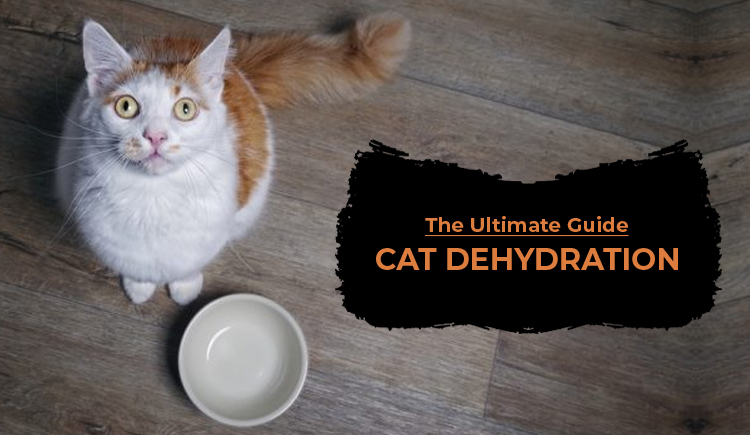
We, humans, are conscious about our daily water intake and try to drink as much as we can to sustain a healthy life. But have you ever wondered if your cat is drinking enough water in a day? Cats are known for their sneaky and sly nature which can make it difficult for you to know whether or not they are dehydrated. It thus becomes necessary for you as cat parents to know if your feline baby is well hydrated. This blog will provide the ultimate guide to everything you need to know about the causes, signs, treatment, and prevention of cat dehydration.
What Is Cat Dehydration?
Cat dehydration refers to excessive fluid loss from the cat’s body, which not only includes loss of water but also same of essential minerals like chloride, potassium, sodium, etc. that are essential to maintain healthy bodily functions. If left untreated, cat dehydration can invite severe health conditions. Thus, every cat parent should be informed about the causes that lead to cat dehydration and ways to avoid it.
What Causes Dehydration In Cats?
One of the most common reasons for your cat to become dehydrated is because the amount of fluid lost from its body is greater than the amount taken in. It can be possible that your cat isn’t drinking enough water and losses most of it due to sweating. Here are a few factors responsible for dehydration in cats:
- Vomiting
- Hot weather
- Less intake of wet or canned food
- Metabolic diseases like kidney disease or diabetes
- Diarrhea
- Trauma
What Are The Signs That Indicate That Your Cat Is Dehydrated?
It can be quite difficult to know if your feline is drinking enough water since you can’t always follow them to check if they did so or not. But it is also important to monitor your cat’s water intake or you’ll never know if they are suffering from dehydration. Fortunately, there are some ways to detect low fluid levels in cats. Here are a few signs that can be observed for cat dehydration:
- Panting
If you notice your cat panting, it can be due to a medical ailment, since panting is not normal in cats. Thus, it is your cue to take them to the vet for a check-up and diagnosis.
- Sunken Eyes
Being one of the most significant causes of sunken eyes, dehydration in cats can make their eyes appear sickly and abnormal to you.
- Loose skin
Cats with good hydration have elastic and healthy skin. Meaning, if you pull their skin, it will snap back into place quickly. But, if your cat is suffering from dehydration, then the skin may fall or take time to snap back into place.
- Thick Saliva or Pale and Sticky gums
Cats have pink and moist gums when their water intake is optimum. In cases otherwise, their saliva gets thicker and their gums start to become dry, pale, and tacky. Furthermore, sticky gums indicate severe dehydration in cats.
- Lethargy and Weakness
Weakness can be associated with any medical ailment in cats. If you observe your cat suddenly becoming lethargic and weak along with other enlisted signs, your cat may be suffering from dehydration.
- Loss of appetite
If your cat denies to take meals and has lost their appetite, it can be due to dehydration.
What To Do If Your Cat Has Dehydration?
Water is lost in the form of urine, sweat, bile, or humidity from the feline body. Since, in any form, the loss of excessive water can lead to dehydration, it is mandatory to keep them hydrated to prevent severe conditions in your cat. If you notice your cat showing signs of dehydration, it is recommended to take them to the veterinarian for advice. Meanwhile, here are some remedies that can help to treat dehydration in cats:
- Administration of Fluids Through IV
Depending on the severity of the situation, your vet may administer fluid therapy either intravenously or subcutaneously. In case of extreme dehydration, your cat may require a few rounds of IV fluids to help them recover from the ailment.
- Monitor and Provide The Water Bowl Daily
Make sure that your pet finishes the water bowl and has access to clean, fresh, and cool water throughout the day. Try replacing the water several times daily since it will make them more likely to drink enough of it.
- Feed More Wet Food
If your cat does not drink water no matter what you do, the best option to keep them hydrated is to feed them wet food. Canned or wet food contains moisture naturally and helps to maintain a balance as compared to dry food.
- Soup Supplements
Cat soup is one of the best nutritional supplements that you, as a cat parent, can give your feline baby. These supplements are highly palatable and available in a wide variety of flavors that your cats can’t resist. Not only will it help them stay hydrated but will also add to their nutritional requirements.
- Detecting the cause
It is of foremost importance to figure out what caused your cat to get dehydrated in the first place. You would not want your cat to develop such a condition again, and thus to avoid this recurring condition it is necessary to find and solve the underlying issue.
How To Prevent Dehydration In Cats?
It’s no news how important it is to prevent your cat from getting dehydrated; and being a pet parent, you should be aware of the steps by which you can do it. Try to increase their water intake gradually if you suspect them not having enough water. Given below are a few ways which can help you avoid dehydration in cats:
- Normally, to sustain a healthy life, cats should consume about 3.5-4.5 ounces of water per five pounds of body weight per day. Provide them with adequate quantities of fresh water to satiate this nutritional requirement.
- Increase the quantity of wet food in their meals. Consult your veterinarian about transitioning to canned foods.
- Make sure that you provide your cat with a well-ventilated environment, and that they do not suffer from heatstroke or overheating.
- Monitor them for their water intake on regularly. If you notice them not consuming enough water, consult your vet.
- If your cat denies water, start by giving meat-flavored juice or water out of a can of tuna. The meaty or fishy smell might entice your cat.
Learn More about- Heatstroke in Dogs – Signs, Care, and Prevention
End Note
If neglected, dehydration in cats can be extremely harmful. If you notice signs of dehydration in your cat, try remedies to tackle the situation at home. However, be prepared to visit an emergency veterinarian if necessary. Take your feline baby for routine checkups to predict any major underlying illnesses. At last, you are the one whom they look up to for their needs and cure, and thus it becomes your duty to take the utmost care of them.

